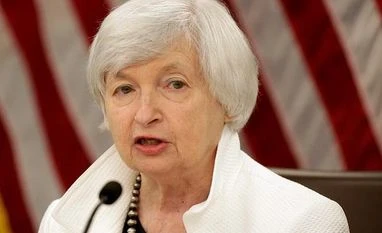US Treasury Secretary Janet Yellen said Sunday that deterring the use of tax havens will let countries compete on economic fundamentals instead of by offering ever-lower tax rates that deprive governments of money for infrastructure and education.
Yellen spoke after finance ministers from the Group of 20 major economies endorsed a global minimum corporate tax of at least 15 per cent, a measure aimed at putting a floor under tax rates and discouraging companies from using low-rate countries as tax havens.
This deal will end the race to the bottom, she said at a news conference after the end of the meeting in Venice.
Instead of asking the question: Who can offer the lowest tax rate?,' it will allow all of our countries to compete on the basis of economic fundamentals on the skill of our workforces, our capacity to innovate, and the strength of our legal and economic institutions.
"And this deal will give our nations the ability to raise the necessary funding for important public goods like infrastructure, R&D, and education."
The global minimum proposal faces political and technical hurdles before it would take effect.
Details are to be ironed out in coming weeks at the Organisation for Economic Cooperation and Development in Paris, followed by a final endorsement by presidents and prime ministers of the Group of 20 at an October 30-31 meeting in Rome.
Countries would then need to legislate the rate into their own laws.
Also Read
The idea is for headquarters countries to tax their companies' foreign earnings at home if those earnings go untaxed in low-rate countries. That would remove the reason for using complex accounting schemes to move profits to subsidiaries in low-tax nations where the companies may do little or no actual business.
The US already has such a tax on overseas profits, but the rate is below the 15 per cent minimum. Congressional Republicans have expressed opposition to President Joe Biden's proposal to raise the rate on overseas corporate profits to 21 per cent to help pay for infrastructure and investments in clean energy. The Democratic president has only a narrow majority in Congress.
Three European Union countries that took part in talks over the minimum tax have refused to endorse the proposal. Ireland, Hungary and Estonia could obstruct adoption in Europe, where tax matters at the EU level require unanimity.
Ireland, whose low tax rates are part of its pro-business economic model, has said its 12.5 per cent headline rate is a fair rate.
The tax proposal would also give countries the right to tax part of the profits of big global companies that earn money in their jurisdiction but have no physical presence. Examples would include online retailing and digital advertising.
Some countries, led by France, have already started imposing such taxes on US tech companies such as Google and Amazon.
The US considers such taxes to be unfair trade practices and has threatened retaliation through tariffs on imported goods. Under the tax deal, countries would drop those taxes in favour of a single global approach.
(Only the headline and picture of this report may have been reworked by the Business Standard staff; the rest of the content is auto-generated from a syndicated feed.)



)